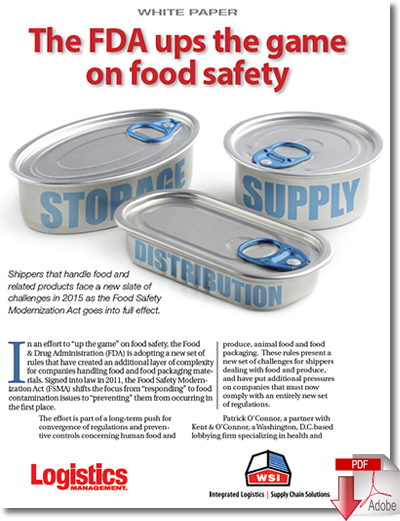The Government’s Role in Food Safety
Large food companies with complex production chains have ingredients from farms and ranches all across the globe and their products processed in numerous plants; which leaves consumers with no idea where their food comes from.
As an organic farmer from north-central Montana, I’ve always believed it’s important for consumers to know where their food comes from.
Too many folks now think that milk comes from a carton, not a cow.
This is largely due to the rise of multi-national food corporations, which dominate the marketplace. In the United States, four companies own more than 80 percent of the beef market, and one company, Monsanto, controls 85 percent of the corn and 91 percent of the soybeans.
More and more large food companies have ingredients coming from farms and ranches all across the globe, and their products are processed in numerous plants around the world.
These types of complex production chains have created consumers who have no idea where their food comes from and government regulations tailored to multi-billion-dollar corporations.
But with the rise of the local food movement and the consumer’s desire to return to the core principles of safety and transparency, we need to adjust government regulations so they work for smaller, less complex food chains.
According to the U.S. Department of Agriculture, the number of farmers markets increased by more than 50 percent over five years, from a little more than 5,200 in 2009 to more than 8,200 in 2014.
Small producers know where their apples were grown, probably in their backyard; they know where they turned them into a pie, probably in their kitchen. It’s a simple supply chain with less opportunity for contamination, so why should they be subject to the same regulations as Betty Crocker?
They shouldn’t.
That’s why, in 2010, I was proud to help pass the Food Safety Modernization Act (FSMA) and include a small producer exemption to ensure that folks who sell food directly to consumers weren’t subject to the same rules as major ag corporations.
Tackling FSMA Through Food Safety Programs
Clearly, the impact of FSMA on shippers handling the products that the law covers will be expansive. To help them effectively navigate the process, 3PLs have stepped up to the plate and offered up a host of services designed to ease the burden.
“Once the FSMA went into effect, we re-registered our facilities under the new act,” says Ryan Hannam, operations director at integrated logistics provider WSI. “We handle food products for many shippers and are knowledgeable of the regulations. In turn, we can make sure that companies’ products are protected as they move through the supply chain.”
As part of that commitment, WSI has created a food safety program that is applied to all its’ food-grade facilities. Within that program, Hannam says that the 3PL addresses all of the important FDA regulated areas as well as state and local regulations.
“We focus on everything from pest control to good manufacturing processes to product recalls, and everything in between,” says Hannam, “all with an eye on helping shippers most efficiently and effectively navigate existing and future compliance requirements.” With a large portion of the FSMA centered on documenting processes, WSI also handles facility cleaning and pest control schedules, documentation of those schedules, the tracking of inbound and outbound loads, and the documenting of vehicle seal numbers.
My amendment protects small family farms from overly burdensome regulations aimed at big businesses with complex supply chains. Those regulations would do little to improve food safety for the small producers while undoubtedly forcing some of these operations out of business. We’re talking about farmers and processors who sell their product at farmers markets and directly to local restaurants — not national chains. For these folks, keeping food safety regulations at the state and local level makes a lot of sense. My amendment also allows FDA to remove this exemption in the rare instance that the farm or facility is linked to an outbreak of any kind.
By cutting red tape for small producers, we are giving these entrepreneurs a better shot at success. And when they succeed and more folks are buying local, more consumers know how their food came from the ground to their kitchen table.
This is the key to food safety.

The relationship between a family and their farmer is important, not just to ensure the safety of food, but to preserve a rural way of life that is the backbone of so many economies.
U.S. Sen. Jon Tester, a Montana Democrat, was co-author of the Tester-Hagan Amendment to the Food Safety Modernization Act, which exempted certain small, local producers from regulation. He sits on the Senate Appropriations Committee and also on its Subcommittee on Agriculture, Rural Development, Food and Drug Administration, and Related Agencies.
Source: Food Safety News
Related: How FSMA Will Impact Shippers in 2015 and Beyond















